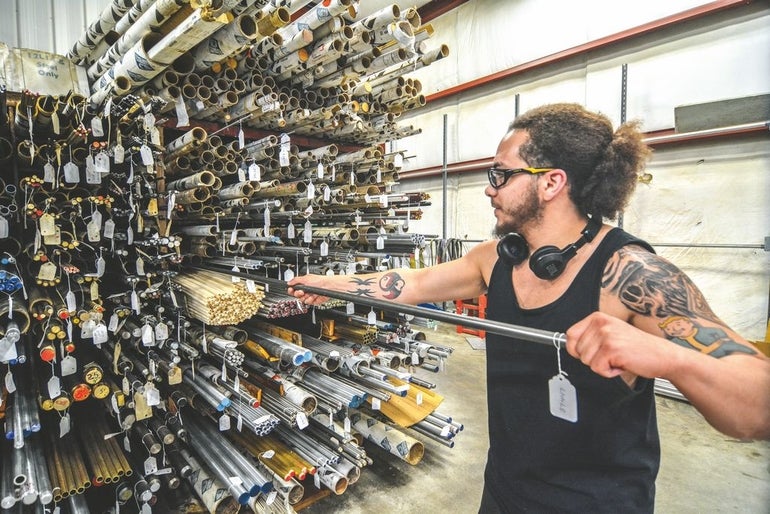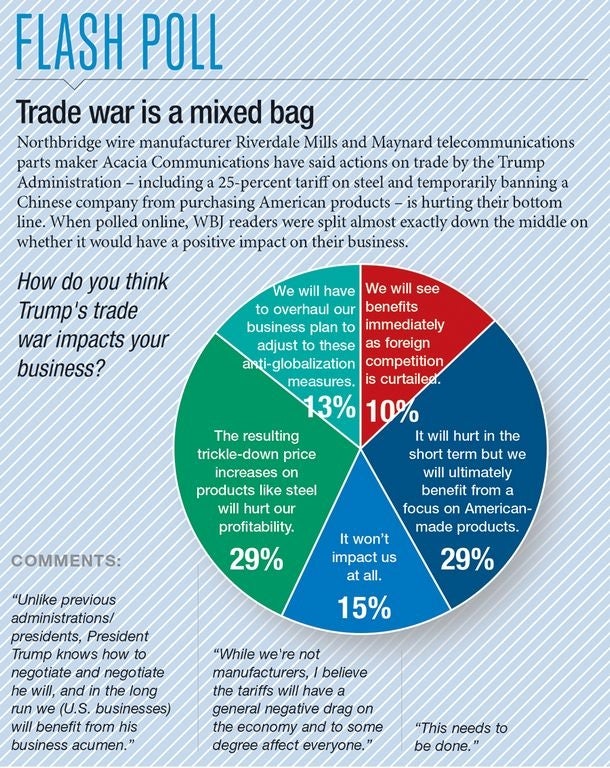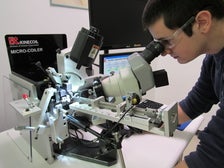Manufacturers look to avoid layoffs as Trump's tariffs eat into their bottom line
The impacts of new federal tariffs against imported goods have been swift and immediate for Central Massachusetts manufacturers, who are seeing their raw material costs spike while they remain locked in fixed-price deals for their goods.
In early June, President Donald Trump's administration imposed tariffs on imported steel and aluminum from places like Europe, Canada and Mexico. Steel imports were taxed at 25 percent while aluminum was taxed at 10 percent.
For businesses in Central Massachusetts using foreign steel and aluminum to make their products, the tariffs force them to either eat the added costs or pass them onto customers. Even if they can switch to a domestic supplier, those prices are increasing due to rising demand and a new market price standard set by the tariffs increase.
“Tariffs are really going to hurt a lot of people,” said Robin LeClaire, president of Uxbridge gear and mechanical assembly manufacturer Lampin Corp.
Locked into contracts
Lampin is choosing to not pass on the increased costs, which are averaging about 15 percent more than what the company was paying for its metals – primarily from Canada – before the tariffs were implements.
The company is largely a job shop. As such, Lampin quotes customers based on the current cost of the material and can't easily increase the quote once the materials go up.
“We've already quoted customers,” said LeClaire. The costs “have eaten into our profit.”
Moving forward for future jobs, if materials are going to make up a big part of any particular project, Lampin employees are taking extra steps to accurately quote customers.
Avoiding personnel cuts
West Boylston vehicle cab manufacturer Curtis Industries has seen its prices on raw materials go up about 50 percent in the past two years not just because of tariffs, but due to domestic steelmakers increasing costs in anticipation of the tariffs, among other reasons.
CEO George Psyhojos said ongoing trade disputes with Canada, China and European countries – where Curtis sources much of its material – could be potentially devastating if the situation escalates with more tariffs on raw materials and finished goods.
The company is growing, having just moved to a new facility in West Boylston. Personnel or capacity cuts are the last thing Psyhojos and the company want to consider. Rarely will a customer be willing to take on the additional charges to spare Curtis from eating into its own profit, Psyhojos said.
“We're hoping a lot of the talk of tariffs are a lot of noise and will go away,” he said. “If they don't, it will be problematic for us or anyone else that manufactures products and consumes parts and/or materials.”
Limited domestic supply
If the U.S. had enough steelmakers to produce materials comparable to prices overseas, the tariffs would be helpful to the steelmaking industry while minimizing impact on manufacturers producing finished goods.
“But, the reality is we don't have the capacity in the U.S. to supply steel,” Psyhojos said.
According to the U.S. Geological Survey, domestic steel production fell from 86.9 million metric tons in 2013 to 78.5 million metric tons in 2016 before jumping to an estimated 82 million metric tons last year.
Using the U.S.G.S.'s 2017 estimates, America ranked fourth in raw steel production behind China, India and Japan.
The U.S. lags further behind in production of crude iron, producing an estimated 23 million metric tons in 2017, well behind China at 730 million metric tons.
That dynamic sets up a typical supply-and-demand issue at home. Domestic metal makers are raising their prices as they struggle to keep up with demand, delaying projects and pushing out the length of contracts.
At Oxford precision machine shop Swissturn, which uses domestic steel, the lead time to purchase the raw material for one project went from six weeks to 21 weeks, said President Ken Mandile said.
“That's hard to swallow,” Mandile said.
Swissturn's prices for raw materials are increasing by as much as 15 percent, mainly for aluminum. Further, the company's domestic steel suppliers are struggling to meet demand as companies place large orders to stock up to avoid any unforeseen price hikes.
“The fear alone of tariffs has disrupted the market,” Mandile said.
Losing confidence
That uncertainty even helped to bring the Associated Industries of Massachusetts' business confidence index down in June, when it dropped more than five percentage points to 61.3. That number is still considered optimistic and was influenced by other factors, including the planned minimum wage increase to $15 per hour over the next five years.
“Member employers are deeply concerned about a potential trade war with China and with key U.S. trading partners such as Canada, Mexico and the European Union,” President and CEO Richard Lord said in a press release announcing the drop in confidence.
The tariffs not only impact the cost of raw materials, but the ability to sell to and expand in countries like China, which is implementing tariffs of its own on U.S. goods, said Christopher Geehern, executive vice president of marketing and membership at AIM.
“By far the most important is the rising raw material prices and supply chain disruptions,” Geehern said.
With virtually no steelmakers in Massachusetts, the steel tariff has no benefit to the state, Geehern said.
He said metal cutting and fabrication shops in the state are getting hit particularly hard. AIM member companies have reported steel or aluminum price increases of more than 100 percent, Geehern said.
Despite the uncertainty and rising raw material costs, Swissturn is optimistic the company won't have to lay off employees or reduce it capacity, as the firm stays busy with customer projects, Mandile said.
Tariffs “make it hard to predict what your costs are going to be,” he said.














0 Comments